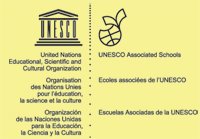"Intercultural dialogue forms the basis for mutual understanding, respect and, above all, tolerance. That’s why DaimlerChrysler and UNESCO since October 2003 jointly launched the Mondialogo School Contest to motivate students to explore and appreciate the cultural diversity on our planet.
"The Mondialogo School Contest is the biggest contest between schools in the world where school students between 14 and 18 years of age from around the world get into contact and dialogue with one another. Mondialogo is aimed at giving a platform to students to take an active interest in others and to build bridges towards a harmonious coexistence.
"To do this, we are contacting thousands of schools around the globe, and are inviting teachers and their classes to join. Intercultural dialogue between the students plays a crucial role in the contest. During the project phase, all participants are encouraged to create new bonds and even forge new friendships. Participants shall learn the importance of openness, respect, tolerance and mutual understanding as prerequisites for living together in peace.
"The first Mondialogo School Contest 2003/2004 with approximately 1,500 participating teams and 25,000 students from 126 countries in the world, initiated the dialogue of people and an intensive exchange over borders. The overwhelming resonance and the positive feedback exceeded all expectations.
"For the contest each school will form a partnership with a paired school from another country or from another continent. Together, the students of both schools will specify a project topic that both schools will work parallely. This should involve an in-depth dialogue with one another.
"During the work on the project the teams should go through the following process:
* the conscious discussion with the own culture(s) (I)
* the goal based discussion with the culture(s) of the partner team(s) (YOU)
* the active dialogue with students from other cultures and countries and the development of a common project (WE)
"The results of the two schools that form a partner team are evaluated jointly. Decisive factors in the appraisal are the project results, but particularly the dialogue and the documentation of the project.
"Taking part in the international Mondialogo Symposium in November 2006 in Rome, Italy will thus become one of the highlights of the contest.
This is where two “Ambassadors" from the 25 most committed partner teams together with their teachers will meet the representatives of their partner schools and other participants. During a festive Awards ceremony, three outstanding partner teams will receive a symbolic donation of either EUR 500, EUR 1000 or EUR 1500 to be used for the benefit of their schools.
This years contest is well under way, and the final event of the Mondialogo School Contest 2005/2006 will take place from 4 to 7 November 2006 in Rome, Italy.
Watch the contest website, since we can hope there will be another contest next year.
